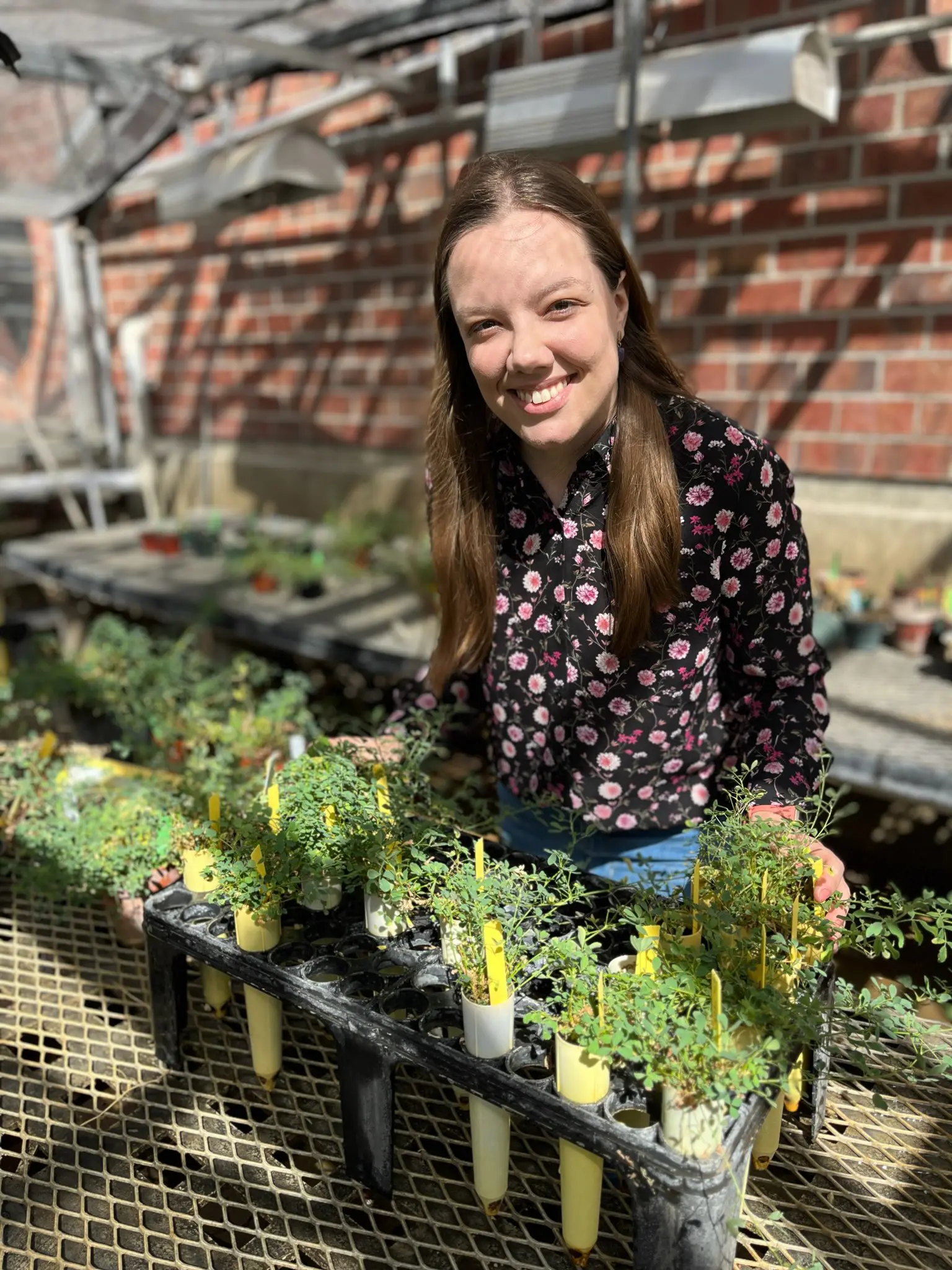USDA fellow bioengineers alfalfa for potentially higher milk yield from dairy cows
Meet Amanda Fanelli de Souza

United States Department of Agriculture (USDA) Agricultural Research Service (ARS) fellow, Amanda Fanelli de Souza, earned first place at Ignite Off! 2023 for her research into alfalfa digestibility for dairy cows. (Photo Credit: Amanda Fanelli de Souza, U.S. Dairy Forage Research Center, USDA-ARS)
Amanda Fanelli de Souza, Ph.D., became fascinated with science, technology, engineering and mathematics (STEM) when her parents stressed how important science and education were during her childhood. Fanelli happily read books on science and fun experiments for children, and in high school her favorite subjects were biology and chemistry. She fondly recalls one high school experiment where they extracted DNA from strawberries. This led Fanelli de Souza to follow her passion into STEM. She earned her bachelor’s degree in biochemical engineering and doctoral degree in industrial biotechnology from the University of São Paulo.
Fanelli de Souza wanted to put her degree into practice by gaining experience and learning new techniques, so she joined the United States Department of Agriculture (USDA) Agricultural Research Service (ARS) through the Oak Ridge Institute for Science and Education (ORISE). The USDA ARS Research Participation Program provides opportunities for students, postgraduates, established scientists and faculty to participate in programs, projects and activities at ARS-designated facilities to help ARS solve agricultural problems of high national priority.
Fanelli de Souza is a part of the U.S. Dairy Forage Research Center team under the mentorship of Michael Sullivan, Ph.D. Her research project is on alfalfa, an important forage crop for cows. Alfalfa is a good source of carbohydrates and protein for dairy cows to help them produce abundant and high-quality milk, but digesting alfalfa can be challenging for the cow’s digestive tract where microorganisms break down plant cell walls.
“The leaves are the most valued part of alfalfa. If the cell walls from alfalfa stems were more digestible, they would be a very good energy source for the cow’s diet,” explained Fanelli de Souza.
She is testing approaches to make alfalfa cell walls easier to break down. One method is to use genetic engineering to manipulate the composition of the cell walls. Fanelli de Souza uses molecular biology techniques that allow changing how much or how little genes within the cell express themselves, also known as gene regulation. Turning down a gene called uxs in alfalfa might lessen the production of xylan, which is tough to digest in the cell wall. Reducing xylan production might also increase the amount of other cell wall components that are more digestible, such as pectin and cellulose. Once perfected, Fanelli de Souza hopes that this method will be used to produce new varieties of alfalfa that are easier to digest and more nutritious for dairy cows.
“The better use of the forage biomass and its higher digestibility would also be beneficial to the environment,” said Fanelli de Souza. “If the cows have enough energy, they don’t waste as much nitrogen from their diet. Also, obtaining higher yields in milk production is important from an economical point of view.”
Sullivan and Fanelli de Souza published a chapter in Methods in Enzymology, and Fanelli also presented the research at a Gordon Research Conference on improving biomass use.
Fanelli de Souza was also a part of ORISE’s 2023 Ignite Off! competition, where she earned first place for her five-minute presentation “Can We Improve Milk Production by Making Alfalfa More Digestible?” She found the competition to be a good challenge and said that it helped her develop important skills, such as communicating to a broader or lay audience.
As a fellow, Fanelli de Souza is learning to create her own research projects, receive hands-on experience in a laboratory and collaborate with other scientists. Her favorite part is talking to fellow scientists because she can learn from them and improve her methods based on their input. She recommends the USDA-ARS program to others.
“I believe it is a good opportunity to learn new techniques and skills in different areas. I am gaining more experience in conducting all steps of a research project. There are also many opportunities for professional development, such as seminars hosted by ORISE and other events.”
After she completes her fellowship, Fanelli de Souza plans to continue with STEM at either a research institution or as a university professor. She loves teaching and has always found teaching STEM students in the lab to be enriching. Until then, Fanelli de Souza continues her research into improving an important livestock crop that could offer agriculture and economics a boost in productivity.
The USDA ARS Research Participation Program is funded by USDA and is administered through the U.S. Department of Energy’s (DOE) Oak Ridge Institute for Science and Education (ORISE). ORISE is managed for DOE by ORAU.

